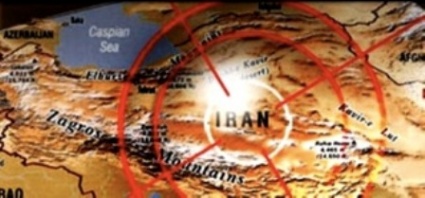February 15, 2012
Iran in the crosshairs

As the threats of war against Iran have been escalating in the last few weeks, Zafar Bangash, Director of the Institute of Contemporary Islamic Thought, said the majority of Canadians don't want war, so we have to resist this madness that is being pushed down our throats.
Speaking at McMaster University at a presentation entitled “Iran in the Crosshairs” Mr. Bangash emphasized what he described as a campaign of misinformation by the United States - similar to the one used to justify the war in Iraq – that is now being used to prepare for war against Iran.
He said that between 2003 and 2005 the International Atomic Energy Association (IAEA) subjected Iran's nuclear facilities to a thorough inspection and found nothing illegal, yet western powers still refused to lift their sanctions. Then in its November 8, 2011 report, the IAE said it's inspectors believe Iran may have conducted a secret nuclear program.
“They said 'we think.' They suspect but they have no evidence,” Mr. Bangash said. In mid-January 2012, in Istanbul, the Iranian foreign minister Ali Akbar Salehi told the P5 + 1 (five permanent member of the UN Security Council plus Germany) that Iran would negotiate in good faith, but the western powers must first recognize Iran's right to enrich uranium, in accordance with Article 4 of the Non-Proliferation Treaty (NPT). However, the western powers continue to insist that Iran must stop enriching uranium.
On January 29th, Mr. Salehi reiterated Iran's position, as senior members of the IAEA began a three-day inspection of Iran's nuclear facilities. "No one has the right to tell us to halt enrichment. Enrichment is our right based on the NPT (Non-Proliferation Treaty) and our being an official member of IAEA, and no one has the right to ask us to stop this legal activity," he said, adding that Iran "fully adheres" to IAEA regulations. "The inspection delegation can visit any of our nuclear sites it requests to visit," Mr. Salehi said.
Meanwhile, Mr. Bangash said the oft-repeated quote from Iranian president Mahmoud Ahmedinajad that Israel should be wiped off the map is a good example of the misinformation campaign, Israel and the United States are using to justify war against Iran.
“This is a quote taken from the October 2005 Conference in Iran, the theme of which was “A World Without Zionism.” It was attributed to President Ahmedinajad, but it's not true. Just like the apartheid regime in South Africa, the Soviet Union and Yugoslavia have disappeared, Ahmedinajad said the regime occupying Jerusalem 'should be removed from the page of time.' This is the correct translation from Farsi. They've (western powers) distorted it so they can promote their own agenda.”
Moreover, Mr. Bangash said President Ahmedinajad doesn't deny the Holocaust. “He asks who the perpetrators of the Holocaust were - it's well – documented that it was the Germany government. Then he asks why the Palestinians must pay the price for it.”
Although President Obama said in his State of the Union address that the United States is determined to prevent Iran from acquiring nuclear weapons, and no options are off the table, Mr. Bangash said he doesn't believe the western powers will attack Iran – at least not at this time – because they understand the implications and consequences.
“Iran's nuclear facilities are wide-spread. It would be impossible to destroy all of them. Iran has thousands of missiles. They could hit U.S. forces in Afghanistan, Bahrain, the Persian Gulf and Qatar, as well as the oil in Saudi Arabia. Iran has already said, 'If you hit our missiles, we have 1,000 missiles pointed at Israel's nuclear facilities.' ”
One U.S. intelligence analyst said that an attack on Iran will only further Iranian determination to acquire nuclear weapons, causing Iranians to rally around their leader and redouble their nuclear efforts deeper underground, with no IAEA inspectors present.
Amid all this speculation about war, Mr. Bangash said war is no longer the solution to the world’s problems: negotiations are.
“They (western powers) have to negotiate with honesty. Iran said it will adhere to certain principles. As a signatory to the NPT, under article 4, it has the right to enrich uranium. If they (western powers) accept this, Iran will offer whatever assurances and guarantees the west wants.”
In an interview before his presentation, Mr. Bangash said he thinks Iran is being targeted because it has broken the international system created by the victors of WWII, which accepted U.S. supremacy.
“They (Iran's leaders) insist they want to pursue an independent policy. Every other Muslim country is dictated to by the U.S., even if it goes against their own interests. If Iran is able to set its own policy, it may set a precedent others may emulate.”








